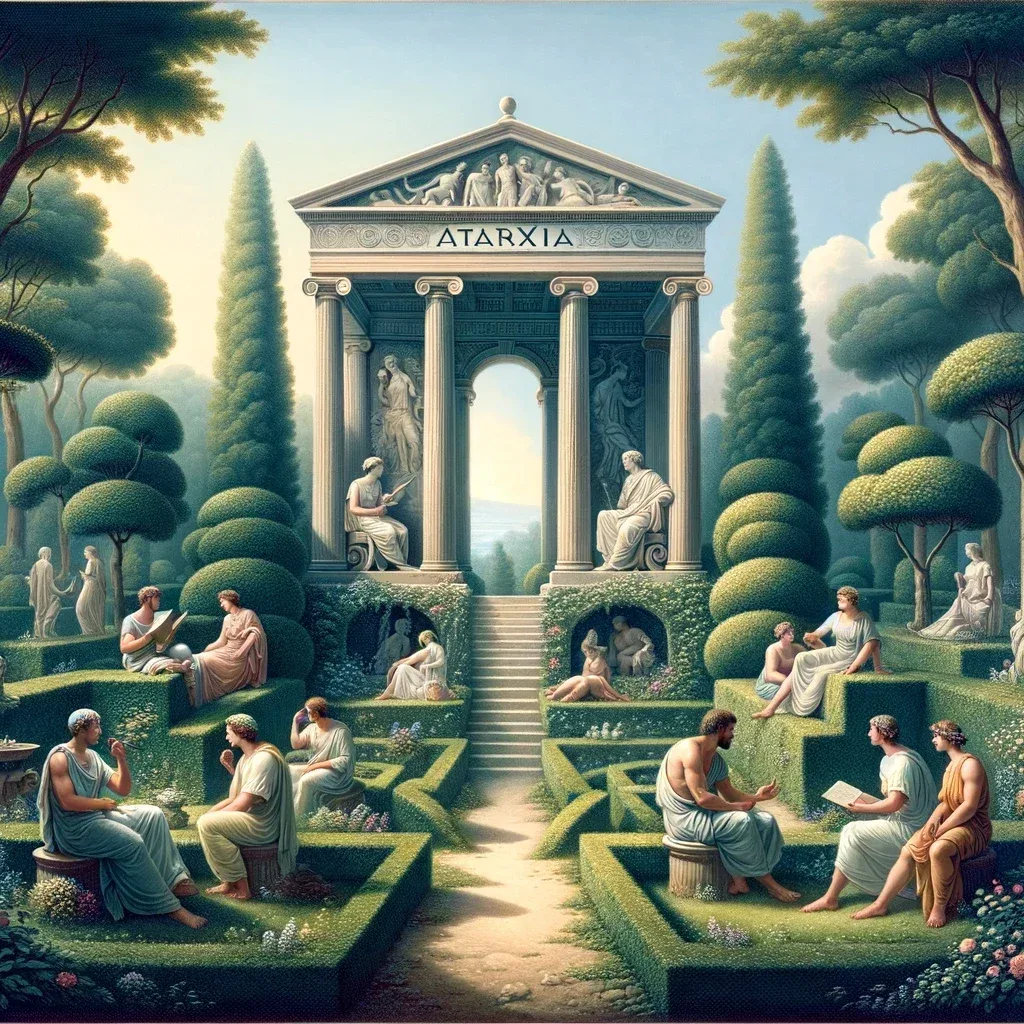Pleasure, according to Epicurus, is not a mere hedonistic whim, but rather the north that guides humanity in the search for happiness. This article aims to unravel Epicurus' definition of pleasure, exploring its nuances and practical applicability in modern life. Throughout this literary journey, we will deepen our understanding of how Epicurean philosophy shapes the perception of pleasure and how we can, through this ancient wisdom, achieve a fuller and more contented existence.

The Nature of Pleasure According to Epicurus
Pleasure as the Absence of Pain
For Epicurus, pleasure reaches its purest form when understood as the absence of pain – a condition of tranquility and health of the body, accompanied by peace and stillness of the soul. This state of ataraxia, as often referred to, is the true expression of pleasure, far from the insatiable search for momentary gratification.
Pleasure as the Ultimate End of Life
Epicurus proposes that pleasure is the greatest good and, consequently, the ultimate goal of life. But it is crucial to differentiate transient pleasures from sustainable pleasures, those that promote lasting satisfaction and contribute to a life of happiness and virtue.
Differentiation of Pleasures

Natural and Necessary Pleasures
Within the Epicurean classification, natural and necessary pleasures are those essential for health and life, such as food and shelter. These pleasures are fundamental and must be satisfied in a balanced way.
Natural but Not Necessary Pleasures
These are pleasures that contribute to well-being, but whose absence does not result in pain. Enjoying a landscape or being in the company of friends are examples that fit into this category.
Vain and Unnatural Pleasures
These are pleasures based on social opinions and unfounded desires, such as the pursuit of fame or excessive wealth. Epicurus warns that such pleasures do not contribute to true happiness and are often sources of disturbance and suffering.
Strategies for Achieving Pleasure

The Hedonistic Calculus
Epicurus suggests a hedonistic calculation, where we evaluate the future consequences of present pleasures. This calculation aims to maximize happiness throughout life, avoiding immediate pleasures that can cause long-term pain.
Self-Reliance as a Path to Pleasure
Self-sufficiency, for Epicurus, does not mean seclusion or social indifference, but the ability to find pleasure within oneself, without being overly dependent on others or external circumstances.
Epicurus and Pleasure in Modern Times

Consumerism and Pleasure
In contemporary society, consumerism is often confused with the search for pleasure. However, according to the Epicurean perspective, consumerism often leads to a vicious cycle of insatiable desires and dissatisfaction.

Technology and Connectivity: New Challenges for Pleasure
The digital age has brought new dimensions to pleasure and pain. Constant connection can be both a source of joy and anxiety, and understanding this duality is essential to applying Epicurus' teachings today.
Conclusion: The Continued Relevance of Epicurean Philosophy
Epicurus's teachings on pleasure continue to offer valuable insights into the pursuit of happiness. In an age of instant gratification and ephemeral pleasures, Epicurus' ideas invite us to reflect on what really contributes to a full and satisfied life.
FAQ: Understanding Pleasure in Epicurus’ Philosophy
Welcome to the Frequently Asked Questions (FAQ) section where we clarify common doubts about Epicurus' philosophy regarding pleasure. Through this FAQ, we seek to provide a deeper understanding of the concepts presented in the article and offer practical insights for applying this timeless philosophy to everyday life.

What is ataraxia and why is it important to Epicurus?
Ataraxia is a Greek term that means “tranquility of the soul” or “absence of disturbance”. For Epicurus, ataraxia is the supreme state of happiness and serenity that results from the absence of physical pain (aponia) and mental disturbance. It is important because, in Epicurus' view, achieving ataraxia is achieving true happiness, which is the ultimate goal of life. This happiness is achieved through moderation, wisdom and knowing which desires to pursue and which to avoid.
How does Epicurus differentiate between pleasures?
Epicurus divides pleasures into three categories: natural and necessary pleasures, which include the basic necessities of life such as food and shelter; natural but not necessary pleasures, which are pleasures that do not cause pain when not attended to, such as moderate luxuries; It is vain and unnatural pleasures, which are based on unfounded desires, such as the search for status and wealth. This distinction is vital to understanding Epicurus's philosophy, as it indicates that not all pleasures contribute to a happy and peaceful life.
What is the hedonistic calculation?
O hedonistic calculation is a decision-making process proposed by Epicurus to evaluate the potential pleasures and pains associated with an action. The goal is to maximize long-term pleasures and avoid pain, leading to a life of greater happiness. This means considering the future consequences of present pleasures and avoiding pleasures that will lead to greater pain in the future.
How does self-sufficiency contribute to pleasure, according to Epicurus?
For Epicurus, self-sufficiency It means having the ability to depend as little as possible on external factors to achieve happiness. It is not a call for isolation, but rather for freedom from desires that depend on the approval or presence of others. A self-sufficient person is able to find pleasure in simple, internal things, such as friendship, reflection and appreciation for nature, which leads to a more peaceful and satisfied life.
How is Epicurus' philosophy relevant in modern times?
Despite having been formulated in Ancient Greece, Epicurus' philosophy is extremely relevant today, especially in an era marked by consumerism and the incessant search for instant gratification. She teaches us to seek sustainable pleasures and live a life of moderation, focusing on what really matters for human happiness. In a world of excess, Epicurus's wisdom can help us find balance and contentment.
How can we apply Epicurean philosophy to improve our everyday lives?
Applying Epicurean philosophy in everyday life can mean a series of practical changes: adopting a more reflective stance on our desires, learning to appreciate simple pleasures, practicing gratitude, developing deep and meaningful relationships and seeking knowledge that frees us from disturbances. unfounded. In essence, it means living more consciously, selecting pleasures that promote a happy and authentic life.
This FAQ section offers a guide for those seeking to incorporate Epicurus's philosophy into their lives, suggesting a way of living that is both simple and deeply enriching.





